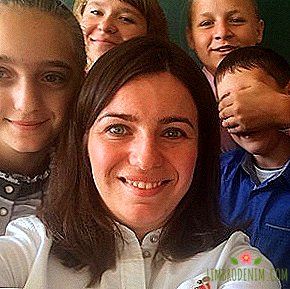"Teacher for Russia": How I left Moscow to teach children
ALMOST TWO YEARS AGO THE PROGRAM "TEACHER FOR RUSSIA" HAS STARTED. Its participants are young people who for two years become teachers in ordinary Russian schools. This is an adaptation of the Teach For All model, which operates in dozens of countries around the world: its goal is to attract specialists to teaching and make the education system more modern. We talked with a participant of the program, Alexandra Zorina, who quit her job in Moscow and has already been teaching history and social studies for six months in school No. 3 in the town of Balabanovo, Kaluga Region.
Before coming to school, I was engaged in marketing for five and a half years, including in advertising agencies. My last place of work was Condé Nast: my career developed successfully, periodically recruiters called me and offered a large salary, but I did not get satisfaction from the job. There was a strong feeling that I put in a lot of energy, but they are wasted. I began to delve into myself: where did I turn the wrong way and why was it so hard for me to go to work, although it seems I’m doing everything right.
In fact, it was still from university days: then I wanted to enter another specialty and to do completely different things. I had excellent mentors at the school, among them were those who wanted to imitate. The idea of becoming a teacher in the eleventh grade did not seem strange to me - it happened a little later, when my classmates began to enroll at prestigious universities. Then the sensation arose, the teaching is something undervalued, wrong and, perhaps, even socially deprecated. So I gave up on those thoughts.
By the age of twenty-five, I remembered that I had once wanted to become a teacher, and began to look for ways in my profession. I had zero experience in teaching and working with children. I began to figure out how to get pedagogical education to those who already have one degree: I did not want to spend five years studying at the university - as a result, I found the program “Teacher for Russia”.
The organizers did not answer me for a long time - for two whole months. Then I had to go through two more stages of selection: an interview on Skype, and then in-person selection, which took place during the whole working day in one of Moscow schools. According to their results, I was interviewed by a methodologist on knowledge of the subject, after which I was invited to the Summer Institute. There, the future teachers study together for five weeks in July and August.
At the Summer Institute, many of the knowledge and skills that will be needed later to work in school are being seriously worked out. First, personal orientation in order to better understand yourself: who you are and what kind of teacher you can become. This is a small but concentrated unit. Secondly, of course, pedagogical and methodical work. All the specialists who came to the institute are already specialists: they have specialized education or experience in the necessary field. However, most of them have never worked with children and do not know how to teach.
You need to be as honest with yourself. Children immediately feel that you are cheating them and instantly lose interest.
A very important part of the training program is the first pedagogical practice for many project participants. This is the "Territory of Summer" camp, where we worked with children for three weeks and had lessons every weekday. They were held in an interactive, playful way, but nevertheless they gave the opportunity to honestly answer the question: is it yours or not. Methodical preparation and work with children lay a solid foundation and allow you to prepare for school in just five weeks.
Now I work in the town of Balabanovo, Kaluga region, and live here. I teach history, social studies, and from this half year also geography in the fifth, sixth and seventh grades. History and social studies are my core subjects: I myself studied at a university as a political scientist. I also studied political geography there, so now I can teach related discipline.
At first it seemed that methodical training was pretty easy, that it was some kind of base that you could learn. In fact, everything turned out to be much more difficult: I didn’t understand anything at the Summer Institute, because I didn’t imagine how it would be applied in practice. The most difficult was the first teaching experience - communication and work with children. Yes, it is a pleasant and satisfying process, but it is very stressful. I had absolutely no idea how to approach this, how to behave, how to actually work.
It was not easy for me: first of all, I had to be as honest with myself as possible, stop being squeezed, be very natural. It took me a long time to overcome myself. Even at the Summer Institute, I unexpectedly discovered that in five years of office life I had blinded many social masks and developed patterned behaviors. It is impossible to do this with children: they immediately feel that you are deceiving them, instantly lose all interest and it is very difficult to build further contact. If you want to earn their respect, but continue to be dishonest with them, you have to either scream (which does not correspond to my inner ideas about how to communicate with children), or begin to ingratiate, which leads to the fact that you lose respect, that you lose credibility. Only after I became as honest as possible with myself and with the children, did I manage to establish good contact. This process was very difficult. I know the guys who gave it much easier, but here everything depends on the person himself.
During the six months that I work with children, I had amazing discoveries, and they happened at the end of this period. It was so touching that it made me cry - I didn’t expect that in a little man, in a teenager, there could be so many mysteries and secrets. There was a case with one of my students. I already wanted to label him "incapable" because there was no reaction from him, no progress in communication or in training. He was very withdrawn, but at the end of the first half of the year, he seemed to burst. I realized that this is a very deep little man: it is difficult for him to interact with the outside world, but he is capable of much. It was necessary just a lot of impact on my part, a lot of attention.
I changed my profession in order to get up every day and feel that I am doing the right thing, honest work that is beneficial. Everything that happened to me since the Summer Institute, everything connected with moving to Balabanovo, going to work in the most ordinary school of this city is all about honesty. For example, now, living in Balabanovo, I feel much more honest than when I lived in Moscow, although this is my hometown. Moscow is great and beautiful, but this is just one of the points on the map, but in fact Russia looks approximately like this city in the Kaluga region. I have a sense of honesty and harmony with what is happening. Without unnecessary pathos, I will say that I often wake up with the thought that I am happy to go to my work, although there are difficult days and difficult moments.
I don’t have an active life outside of work, except, probably, my personal life, in Balabanov, because in Balabanov, by and large, nothing happens. There is no social activity, and just places to go. Everything is very slow, unhurried. This has both disadvantages and advantages: I became much calmer, less stressed before the winter holidays - although in Moscow it was usual for me. This year I refused to go to the capital before the January holidays. At the same time, the pace of my own life is very high: in school, according to the intensity of passions and the number of emotions, the day goes in two. Sometimes, when I leave work, it seems to me that I have lived there for three days already. I work not only within the school - when I come home, I can still communicate online with children. Plus, I prepare lessons every day, I read teaching materials. This is quite intensive work, which is always with me.
The school system is a complex mechanism that can easily bend under itself. You may not notice how to integrate into it, and soon become like the same teacher that many of us didn’t like at school. The system can work effectively, but it is quite difficult. It is necessary to find internal resources in me, constantly asking myself: “And am I doing that now? In accordance with my principles, do I work?” It helps to keep yourself in good shape and returns to reality, helps not to succumb to this mechanism. The school system in our country is complex, and we must find ourselves in it.
In school, by the intensity of passions and the number of emotions, the day goes in two
For a person who worked in a large corporation, the volume of papers in the school is negligible. True, not all of them seem obligatory to me. I want to study the documentary system of school education in order to understand whether all the forms that we fill out are really needed. I want to improve my legal literacy in order to explain to the school administration that perhaps we are now doing extra work.
Modern school definitely need to change. Strangely enough, the Russian educational documents such as the Federal State Educational Standard contain very interesting, important things that are necessary for the development of modern man. But in practice, these principles are not always implemented. Of course, it is necessary to change the approach and in modern children to look for another motivation to learn: it’s strange to think that they might be interested in the same things that people were interested in twenty years ago. Classical science remains classical science, but it must be presented in a different way so that the child can become interested in what is happening in the classroom.
Children in modern school is not easy. They often have no motivation to learn, they feel superfluous in this process. It is very difficult to return the desire to study to a child already in the seventh grade: for so many years, he was shown that it was not interesting at school - you would torment, and then life would begin. From this approach must be abandoned. A school is not a closed institution - it is a place where an interest in knowledge and in life should wake up in a person. It would be great if the school changed in this direction.
To make it so that the child becomes interesting, difficult. When the lessons are constantly reading textbooks and retelling them - it is boring. Modern children and teenagers, to my great regret, interact very poorly with the texts. They do not really understand this model of learning: the text is flat and boring in the understanding of a teenager who spends most of his time on the Internet, watching video bloggers and so on. It is necessary to return interest through some modern interactive mechanisms. Maybe through group work, where a child willy-nilly is involved in the process and is interested in his team performing well. Or in other ways - through visual tools, audio, models that a child can make himself to study the subject with the help of other senses - and not just run around the lines.
It seems to me that this is especially important for a child from elementary school, who still wants to move constantly and it is very difficult to sit still in the class for forty-five minutes. You can first show something interesting, non-standard, and then, when a person has a sparkle in his eyes and he realizes that history is not just a textbook, you can also come to reading the text - including the big one and loaded with facts. But first, there must be interest and motivation. I have not yet succeeded in realizing this — I work too little at school — but this is what I strive for.
For me, the most difficult in work is to find an approach to children who have no desire to learn. At some point, such a burden of attempts to make something better accumulates and somehow to interest children, that it begins to seem that all this is meaningless, that, probably, classical schemes work much better and only in this way can we teach something. This is a challenge that faces me every day.
Unfortunately, in the realities of our country, young professionals receive little - especially in the regions. This is a big problem for a young specialist who has no other source of income. Today I earn exactly ten times less than I received at the previous place of work. Probably, if I hadn’t got into the project (although I came to it with a different motivation, it didn’t have anything to do with money), it would be extremely difficult for me to move and start teaching at school. The program gives a scholarship that allows you to at least rent an apartment and gives a salary supplement.
The program "Teacher for Russia" lasts two years, but I want to continue to teach. Six months was enough to understand that my place here and I really feel good at school, despite all the “but”. The question is, where will I do it further, while it is open - I have one and a half more years to think about it. I do not think that I will stay in the school where I work now. There are many reasons for this: at least when the project ends, I will face the issue of renting housing. Most likely, I will decide to return back to Moscow, but I also want to work there as a teacher.
I have my own projects: I want to deal with the vast documentation base of Russian education, perhaps, to become an expert on this issue and conduct consultations. This is directly related to the school and can help improve the process from the inside, make it more efficient. It would be great if teachers could spend more time not on documents, but on preparing lessons. In any case, it seems to me that I have found my business.
Photo: Personal archive






